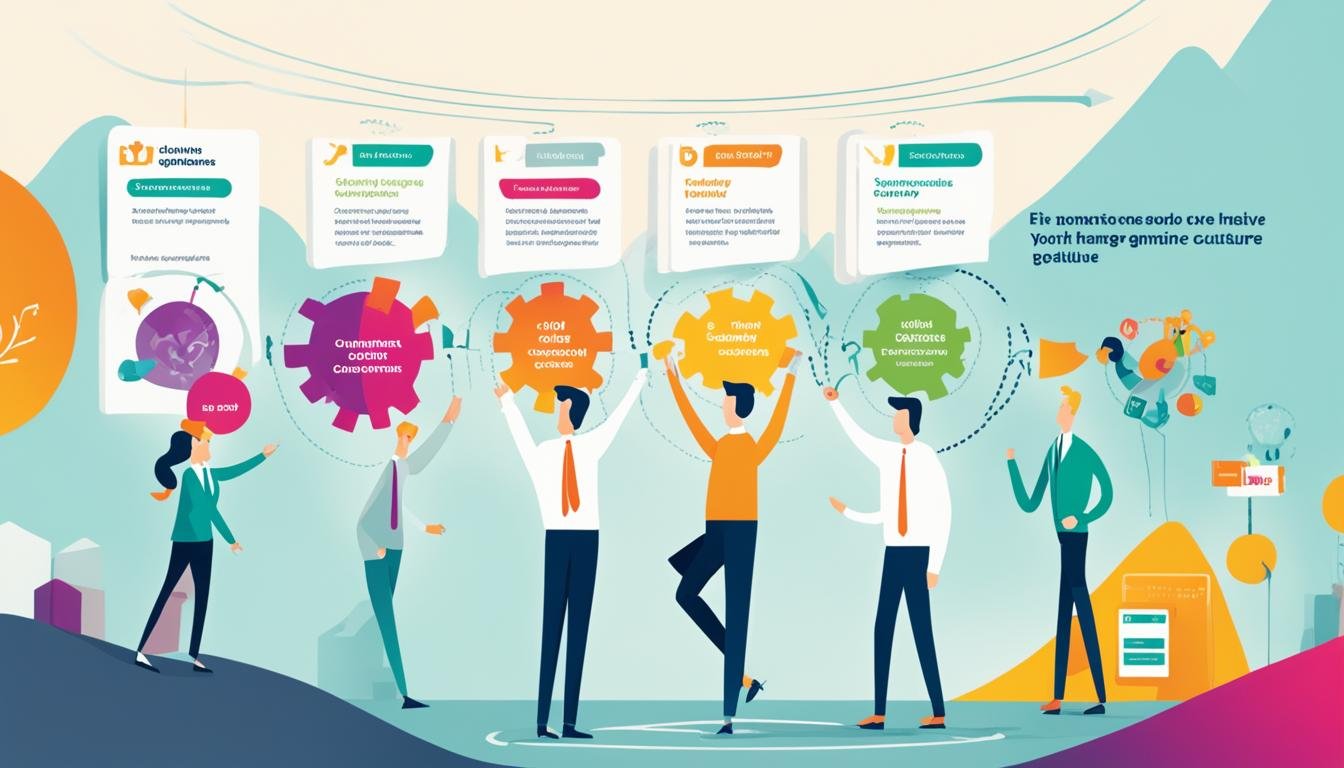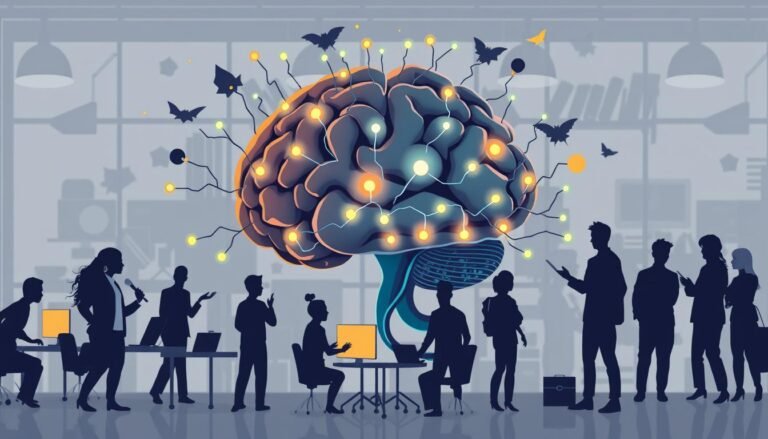Organizational Psychology Approaches to Enhancing Customer Experience in Ireland
Imagine stepping into a cozy café in Dublin. The barista there not only remembers your favorite coffee but asks about your recent trip. This type of special touch, thanks to excellent customer service, is more common in Ireland. Businesses there are seeing how important organizational psychology is. They are using it to make customer experiences better. This change is helping to meet what customers want in new ways by using Organizational Psychology in Ireland.
Making customer service great goes beyond just training staff. It’s about creating an environment that encourages involvement, respect, and new skills. Here we explore how Irish businesses are using psychology to ensure that customers keep coming back for more.
Key Takeaways
- Customer Experience Revolution: Companies are transforming their customer service strategies through organizational psychology.
- Organizational Psychology in Ireland: Irish businesses are proactively using psychological insights to enhance customer relationships.
- Employee Engagement: Happy and engaged employees are key to offering exceptional customer service.
- Practical Training: Programs like MAPP are equipping employees with the skills needed for modern customer service roles.
- Global Perspective: International internships and immersion trips are providing Irish employees with diverse customer service experiences.
Introduction to Organizational Psychology and Customer Experience
Organizational Psychology boosts how a company works by using *psychological principles*. It makes business better by focusing on how people act in the workplace. This way, companies can make their customers happier and more loyal.
Deirdre O’Shea is a key figure in this area, helping to make big changes. Her work involves overseeing studies with many researchers. Thanks to support from top groups like the Higher Education Authority and the Irish Research Council, she can dig deep into important topics.
Studies, like the one in the *European Journal of Work and Organizational Psychology*, help show how psychology can help in business. They look at things like how we view gender in schools and how leaders handle tough times like COVID-19.
Understanding consumers is key. The MSc in Consumer Psychology explores consumer behavior through three main areas:
- Consumer Insight and Understanding: Learning about consumer psychology, how people make choices, and how to buy sustainably.
- Data Collection and Analysis: Using tools to gather and study data, like R Statistical Language and Google Analytics.
- Employability and Transversal Skills: Building skills for work with exercises in intercultural work (X Culture) and projects with companies.
Top researchers, like Barrick and Thurgood, look into how the workplace can affect customer satisfaction. They study aspects like company culture and ways to keep employees motivated. Their findings show that smart organizational psychology can really help businesses do better.
Another important area looks at how assessing employee performance can lead to happier customers. DeNisi and Murphy have researched how a good work environment can improve how employees serve customers. This highlights the role of good management in creating a top-notch customer experience.
Studying *psychological principles in business* has won many awards says a lot about its usefulness. Scientific contributions mixed with hands-on actions prove that focusing on people in a company leads to better customer service. This ongoing study bridges the gap between theory and practice in business, always putting the customer first.
| Organization | Research Focus | Awards and Recognition |
|---|---|---|
| Higher Education Authority | Gender Stereotypes in Higher Education | Best Paper Award 2017 |
| Health Research Board | Emotion Regulation Strategies | Best Paper Award 2019 |
| Erasmus+ | Teaching Mobility Program | Erasmus Teaching Mobility Award 2017 |
| Irish Research Council | Work and Organizational Psychology | Best Paper Award 2017 |
The Role of Emotional Intelligence in Enhancing Customer Experience
The link between emotional intelligence and customer service is grabbing a lot of eyeballs in the world of organizational psychology. Many studies have shown how adding emotional intelligence to work settings can deepen client relationships and better service quality.
Understanding Emotional Intelligence
Emotional intelligence means knowing, understanding, and handling our feelings and the feelings of others, as Daniel Goleman explained. Studies, like the one led by Prati et al. in 2003, show emotional intelligence is key for leading teams to perform better. Carmeli in 2003 dug into how emotional intelligence affects work attitudes, especially in top managers’ behavior and results.
Application of Emotional Intelligence in Customer Service
In customer service, training in emotional intelligence is crucial. Work by Lopes et al. in 2006 proved it leads to better job success and attitudes, improving how we act in the workplace. Emotional intelligence training helps employees meet customer needs more effectively, boosting their happiness.
Case Studies: Successful Implementations in Ireland
In Ireland, many businesses have adopted emotional intelligence training to boost how customers feel about their services. Results from 1,063 TripAdvisor reviews identified three key behaviors linked to making customers happy: showing dedication, taking part actively, and being resourceful. These customer actions are heavily influenced by how emotionally connected they feel with the staff, leading to better reviews.
A study in Maharashtra also showed a clear tie between emotional intelligence and traveler joy, highlighting its crucial role in customer happiness.
| Year | Study | Key Findings |
|---|---|---|
| 2002 | Judge et al. | Highlighted the importance of emotional intelligence in leadership |
| 2003 | Melita Prati et al. | Enhanced team performance through emotional intelligence |
| 2006 | Lopes et al. | Linked emotional intelligence to job performance and workplace behavior |
| 2010 | Cherniss | Clarified the concept of emotional intelligence in organizational psychology |
The successes seen in Ireland’s hospitality field underscore how adding emotional intelligence to customer service can be a game changer. With training in emotional intelligence, employees can create more heartfelt interactions, which bump up customer happiness and loyalty.
Customer Service Training Programs in Ireland
In Ireland, training programs for customer service are carefully crafted. Their goal is to boost the skills and knowledge of employees. This makes sure they can deliver top-notch service. The training gives access to eLearning around the clock. It’s a convenient and powerful way to learn for everyone involved.
Key Components of Effective Training Programs
Efficient customer service programs have many important parts:
- Comprehensive Curriculum: They’re made for all sorts of professionals, like managers, customer service reps, retail managers, and more.
- Flexible Access: Learning online means you can go at your own speed, anytime.
- Real-World Relevance: It focuses on using what you learn on the job. Like knowing your customers, their needs, and how to stay ahead.
Benefits of Continuous Training for Employees
Always learning brings many good things:
- Enhanced Employee Development: Training on the regular makes sure workers can handle all questions from customers well.
- Increased Engagement: Workers who learn more feel they matter. This makes them serve customers better too.
- Improved Performance: Learning a lot keeps skills fresh and really helps in giving top service to customers.
Success Stories from Irish Companies
Irish businesses have seen great results from keeping up with customer service training:
SalesSense International: They brought young folks into sales jobs. With a real-world learning approach, their service saw big improvements.
Tesco Mobile: Their ongoing training upped customer satisfaction a lot. This shows the big role that training plays in making customers happy.
Naomh Brendan Credit Union: A focus on always learning and an exciting vision helped them through tough times. They made their community stronger in the process.
These stories show how powerful training is. They prove its key role for any company wanting to stand out.
Employee Engagement Strategies for Better Customer Service
An engaging workforce is key to great customer service. Strategies for employee engagement make sure workers are happy and love their jobs. This boosts performance and keeps customers coming back, building loyalty.
Defining Employee Engagement
Describing employee engagement shows how complex it is. The MacLeod Review found over 50 definitions in 2009. In general, it’s a mental state that affects how employees work, not just the job itself. For example, Utrecht University says engaged employees are full of energy and deeply involved in their tasks. Using tools like the Gallup Q12 can measure this well.
Strategies to Boost Engagement
Many approaches can make workers more engaged:
- Providing Growth Opportunities: Offering chances for personal growth lifts spirits. This step is especially important for new employees to make them feel included.
- Recognition and Rewards: Praising and rewarding hard work increases morale. When employees are appreciated, they work better.
- Increasing Autonomy: Giving employees freedom can motivate them. Feeling trusted and empowered improves how they work.
- Deploying AI Solutions: AI can help improve work by making tasks easier and more personalized. This leads to a better working atmosphere.
Impact on Customer Experience
Employee engagement is closely linked to customer service quality. Studies show that happier employees mean more satisfied customers. This is because strategies that boost engagement improve the connection between employees and customers.
| Statistic | Impact |
|---|---|
| Engaged Employees | 23% increase in profitability, 10% higher customer ratings |
| Disengaged Employees | $8.8 trillion economic impact in 2022 |
| High Turnover Units | 18% reduction in turnover rates with high engagement |
| Low Turnover Units | 43% reduction in turnover rates with high engagement |
| Absenteeism | 81% difference in absenteeism between most and least engaged units |
Good engagement strategies not only improve the workforce but also keep customers happy. A happy, committed team is the foundation of success and loyalty in business.
Positive Organizational Behavior and Its Impact on Customer Relationships
Positive Organizational Behavior is about creating supportive workspaces. This helps in building sustainable business practices. It ensures better relationships with customers. When a company takes care of its employees, customers benefit.
Principles of Positive Organizational Behavior
Building trust and giving meaningful work are key principles. A supportive and teamwork-focused culture is crucial. Studies show that High Performance Work Systems help businesses succeed. They boost financial gains, productivity, and service quality. An example is a study on Chinese and Irish accounting firms. It found out that these systems lead to better financial outcomes and productivity.
Implementing Positive Practices in the Workplace
Creating a supportive work environment is important. It makes employees feel valued and motivated. Good managers focus on communication and HR management. They are key in making the workplace positive. Talking openly and clearly helps reduce stress. It makes employees happier in their jobs. This leads to better interactions with customers.
Case Examples from Irish Businesses
In Ireland, many businesses are using Positive Organizational Behavior. They focus on sustainable practices and caring for their employees. This leads to better teamwork and happier customers. By offering regular training and feedback, these companies build a positive culture.
In summary, Positive Organizational Behavior is crucial for any business. It helps in creating sustainable practices and strong customer relationships. When companies look after their employees and create a positive environment, everyone benefits.
Service Quality Improvement through Organizational Psychology
Many organizations strive to up their service quality. Using techniques from organizational psychology helps a lot. For example, a study of 37 hotels showed us insights on leadership, employee engagement, and the importance of managers. These areas point the way for making things better.
Identifying Areas for Improvement
Data from 235 frontline employees pointed to key areas for making service better. We saw that when leaders were more directive, it didn’t help with serving better. But when leaders involve everyone, service got better. This underscores the value of team work and leadership that listens and engages everyone.
Psychological Techniques for Service Quality Enhancement
Techniques from organizational psychology, like sharing knowledge and giving feedback based on strengths, are key. Studies by Gallup have shown that managers focusing on what employees are good at, rather than their flaws, can do a lot. They can lower quitting rates, boost work quality, and help the company earn more. This approach not only makes work better but also makes people want to stay in their jobs. It’s a win-win.
“Only one in three employees strongly agree that they have the opportunity to do what they do best every day in their workplace.” — Gallup Analytics
Also, economists who study behavior say feelings play a huge part in how we make choices. That’s why building strong emotional ties is crucial for improving services.
Measuring the Impact on Customer Satisfaction
Measuring how happy customers are with us is key. Through their feedback, we can keep improving services to meet their needs better. Knowing what customers say helps us focus on them, which is crucial for them to really connect with our brand and to grow our business.
| Leadership Style | Impact on CSQ | Desirable Outcomes |
|---|---|---|
| Directive Leadership | Negative Relationship | Low job performance, higher turnover intention |
| Participative Leadership | Positive Influence | High job performance, strong organizational citizenship behavior |
Using organizational psychology smartly makes both customers and employees happy. And by keeping an eye on customer satisfaction, we learn how to keep upping our game. This leads to lasting success.
Creating a Customer-Centric Culture in Ireland
For businesses to do well in Ireland’s tough market, becoming customer-focused is key. This means changing the company’s culture to put the buyer first. This piece shows how to do this and talks about the challenges and success stories from Ireland.
Steps to Develop a Customer-Centric Culture
To become customer-centric, businesses need to start from the inside and work out. Here are the basic steps:
- Internal Audit: Check your current customer service practices and find where you lack.
- Employee Training: Hold training that always improves how you deal with customers.
- Empower Frontline Staff: Let frontline workers make quick decisions to help customers.
- Feedback Mechanisms: Set up ways to gather and understand what your customers say.
- Recognition Programs: Give credit and rewards to workers who go above and beyond for customers.
Challenges and Solutions
Making a business truly customer-focused isn’t easy. But, problems can be solved. Here’s how:
- Resistance to Change: Beat the fear of change by involving everyone and sharing the customer-first vision.
- Resource Allocation: Make sure enough resources go to training and getting better all the time.
- Consistency: Keep service quality high everywhere by using good tech and solid processes.
Real-life Examples from Ireland
Cases like PAR show how powerful focusing on the customer can be.
| Attribute | PAR’s Customer-Centric Actions |
|---|---|
| Employee Tenure | Average tenure of over 10 years in customer support. |
| Hybrid Work Model | Up to two days a week work-from-home setup. |
| Commitment | Constantly world-class customer satisfaction ratings. |
| Employee Empowerment | Frontline staff are empowered to make decisions. |
| Team Building | Participation in events like United Way Week. |
Daniel McFadden, PAR’s Customer Support Director, shows the effect of focusing on the customer. After more than 21 years at PAR, moving from an entry role to director proves the company’s dedication to both its workers and customers.
In Ireland at large, the Quality Customer Service Initiative (QCS) and its follow-ups, between 2001 and 2004, show a long-term focus on service. Different departments use various methods to improve service quality, underlining the need for always getting better at serving customers.
The Importance of Psychological Safety in Service Organizations
Psychological safety is key to making a workplace where workers can freely share ideas. In such places, people are not scared of being punished for their thoughts. When employees are free to talk without fear, it boosts innovation, learning, and productivity. This helps the team work better and is good for everyone’s job performance.
What is Psychological Safety?
Dr. Amy Edmondson from Harvard Business School found that psychological safety makes people feel secure at work. This lets them give their best, even when things are always changing. A big study involving 22,000 people from 136 samples showed that when employees feel safe, they perform better. They do better on their tasks and work together more. This is because a safe and open culture at work makes everyone feel part of the team.
How Psychological Safety Enhances Employee Performance
Teams that feel safe are better at using different ideas and work more effectively. Google’s own study showed safer teams are better at solving problems. They are also more innovative. When workers feel their ideas matter, their companies do better. Turnover is lower, safety problems decrease, and work gets more productive. This shows how important feeling safe at work is for doing a great job.
Irish Companies Leading the Way
Irish companies are making great strides in creating safe workplaces. They know this helps them serve customers better. After six months of focusing on safety, team engagement went up a lot. This means employees felt more connected and cared for. Irish companies are working hard to make sure their teams trust each other and work well together. This is key to their success.
It’s important for companies to focus on psychological safety. It’s the best way to keep employees happy and ready to do their best. By putting safety first, service organizations can really shine in customer service and performance. They can reach heights of success they never thought possible.
| Key Findings | Statistics |
|---|---|
| Improvement in Engagement Score | 0.70 Points on Gallup’s Q12 Scale |
| Reduction in Turnover | 27% |
| Reduction in Safety Incidents | 40% |
| Increase in Productivity | 12% |
Enhancing Employee Well-being and Workplace Satisfaction
Investing in how happy and satisfied employees are is key for companies. This makes customer service better. People do better at work when they are happy and feel good about their job. They work more and better and help their teams too.
Strategies for Improving Employee Well-being
Helping workers feel good includes giving them what they need for their job. Support from bosses, chances to grow in their career, and tools for their work are important. Also, offering extra health benefits and time off is helpful. These things make a happy and healthy place for people to work best.
The Impact on Customer Service Quality
When employees feel good, customers notice the difference. This means more satisfied customers. A study in 2005 showed that a caring workplace and good support make workers and customers both happier.
Successful Programs in Ireland
In Ireland, some companies are doing great things for their workers. These efforts have brought real changes in how workers treat customers and in the quality of the service. This is backed by research done by Wright and Cropanzano, and by Organ and Podsakoff.
| Company | Program | Outcome |
|---|---|---|
| Google Ireland | Comprehensive Well-being Program | Higher Employee Satisfaction and Performance |
| Microsoft Ireland | Mental Health Benefits | Increased Engagement and Reduced Absenteeism |
| Accenture Ireland | Career Development Opportunities | Enhanced Employee Commitment and Productivity |
So, making employees happy and satisfied helps everyone, including the customers. A good work environment leads to better work and happier customers.
The Integration of Internet of Behaviors (IoB) in Customer Experience
The Internet of Behaviors (IoB) changes how we see customer service. It uses data to shape how people act and think about things. By 2025, half the world will likely use IoB tools, showing how fast it’s growing.
Introduction to IoB
The Internet of Behaviors gathers data from IoT tools to understand behavior. It uses something called Behavioral Intent Recognition (BIR) to see what customers like in real-time. BIR is handy for marketing, stores, and health care, making the experience more personal.
| Industry | Impact of IoB |
|---|---|
| Marketing & Retail | Enhanced targeted advertising and customer insights |
| Entertainment | Personalized content recommendations |
| Finance | Optimized financial advice and product offerings |
| Healthcare | Improved patient care through predictive analytics |
| Education | Customized learning experiences |
How IoB Enhances Personalization
IoB uses AI and ML to make customer experiences just for them. Companies can change what they offer based on tons of data. This makes everyone happier and helps companies make more money.
Ethical Considerations of IoB Implementation
Using IoB means being careful with how you treat people’s information. Businesses must follow strict IoB Ethical Standards. They need to make sure people agree to share their data and still respect their privacy.
The Internet of Behaviors makes understanding customer needs better. But, following ethical rules is key to make these new technologies good for everyone.
Conclusion
As we end our look into how Organizational Psychology can improve Customer Experience in Ireland, one thing is clear. Using psychological ideas in business can lead to better Customer Experience. This approach has been growing for over 30 years. It’s a mix of understanding people’s behavior, creating better services, and marketing products.
Despite lots of talk among marketers and service designers, there’s still no firm agreement on how Customer and Consumer Journeys fit together.
Research from interviews at the Cambridge Venture Camp 2021 supports a new view on Customer Experience. When we see Customer Experience as complex and varied, we find new ways to make it better. These findings highlight trust, sacrifice, and commitment as key in bringing AI into Customer Experience.
AI is poised to change how customers experience services, especially in retail. By 2023, spending on AI services in retail might hit $12 billion. AI tools, like chatbots and personalized recommendations, are already changing the retail and beauty industries. They help businesses get to know their customers better.
As these AI tools become more common in Ireland, businesses must also think about their internal workings. To really succeed, they should use Organizational Psychology to constantly get better at meeting customer needs.
FAQ
What is the role of Organizational Psychology in enhancing customer experience?
Organizational Psychology helps companies understand how customers think. It helps improve their strategies for great experiences. By doing this, businesses can make customers more satisfied and loyal.
How does Emotional Intelligence improve customer service?
Emotional Intelligence helps workers know and meet customer needs better. This leads to happier and more satisfied customers. In Ireland, training in Emotional Intelligence has shown to be very effective for companies.
What are the key components of effective customer service training programs in Ireland?
The best programs improve main skills, keep teaching them, and use them in real life. This boosts how well employees work and makes them want to keep learning. It helps create a culture where learning never stops.
How can companies in Ireland boost employee engagement?
Offering chances to grow, celebrating success, and making a positive work environment can raise engagement. This makes workers more likely to give great service to customers. It all starts with keeping employees happy and engaged.
What is Positive Organizational Behavior, and how does it affect customer relationships?
It’s about creating a good, lasting workplace that cares for its people. This directly makes customers happier too. Companies who focus on this see that their workers are happy and that their customers are happy too.
How can organizational psychology techniques improve service quality?
By spotting what they can do better and using psychology, companies serve customers better. They check how happy customers are, and what they learn helps them get even better. It’s all about always finding ways to improve.
What steps are involved in developing a customer-centric culture?
Making the company all about the customer includes clear goals and teaching employees. It also means listening to customers and using their feedback in business plans. Learning from other successful Irish companies helps tackle the journey’s challenges.
What is psychological safety, and why is it important in service organizations?
Psychological safety is when employees don’t fear speaking up. This helps a company be more innovative and provide better service. A lot of Irish companies set a good example in this area.
How does improving employee well-being enhance customer service quality?
Focusing on how employees feel makes them happier at work. This happiness then spreads to how they treat customers. This approach has brought big gains for both employees and the companies serving customers.
What is the Internet of Behaviors (IoB), and how does it influence customer experience?
IoB uses data and behavior analysis to customize customer experiences. While it improves personalization, companies must also mind privacy issues. It’s a balance between offering great service and keeping customers’ information safe.
Source Links
- About the Program – Master of Science in Applied Psychology
- Competence-based approaches in organizational and individual context – Humanities and Social Sciences Communications
- Cultural Transformation
- Prof. Deirdre O’Shea
- Consumer Psychology (MSc, PDip) – University of Galway
- Expanding the I-O psychology mindset to organizational success | Industrial and Organizational Psychology | Cambridge Core
- Emotional intelligence, leadership, and work teams: A hybrid literature review
- The Role of Emotional Intelligence in Satisfaction of Customer in Tourism Industry in India
- QQI Customer Service course
- News
- CIPD | Employee Engagement & Motivation | Factsheets
- 6 Effective Employee Engagement Programs – Qualtrics
- Employee Engagement vs. Employee Satisfaction and Organizational Culture
- Chinese and Irish professional service firms compared: Linking HPWS, organizational coordination, and firm performance
- my boss called a mysterious meeting with me and I’m afraid I’m going to be fired
- Summary Organizational Behavior by Robbins and Judge
- Leadership Style and Employees’ Commitment to Service Quality: An Analysis of the Mediation Pathway via Knowledge Sharing
- 3 Ways to Improve Your Employee and Customer Experience
- The Impact of Organizational Culture on Corporate Performance
- Customer Support as a Business Application of Psychology – Execs In The Know
- Developing an Effective Internal Customer Service Ethos.TMP
- How to Create a Culture of Psychological Safety
- 8 ways to create psychological safety in the workplace
- Bridging the Gap between Affective Well-Being and Organizational Citizenship Behavior: The Role of Work Engagement and Collectivist Orientation
- Leadership Strategies to Improve Employee Well-Being
- Meaningfulness of Work and Employee Engagement: The Role of Affective Commitment
- IoB ushering new era of hyper-personalized customer experience | HCLTech
- Internet of Behaviors: What It Is, and How It Could Impact Your Business — ITRex
- Ready To Be Tracked With Internet Of Behavior (IoB)?
- The Role of Consumer and Customer Journeys in Customer Experience Driven and Open Innovation
- Customer experiences in the age of artificial intelligence
- Organizational Psychology on the Rise—McGregor’s X and Y Theory A Systematic Literature Review








